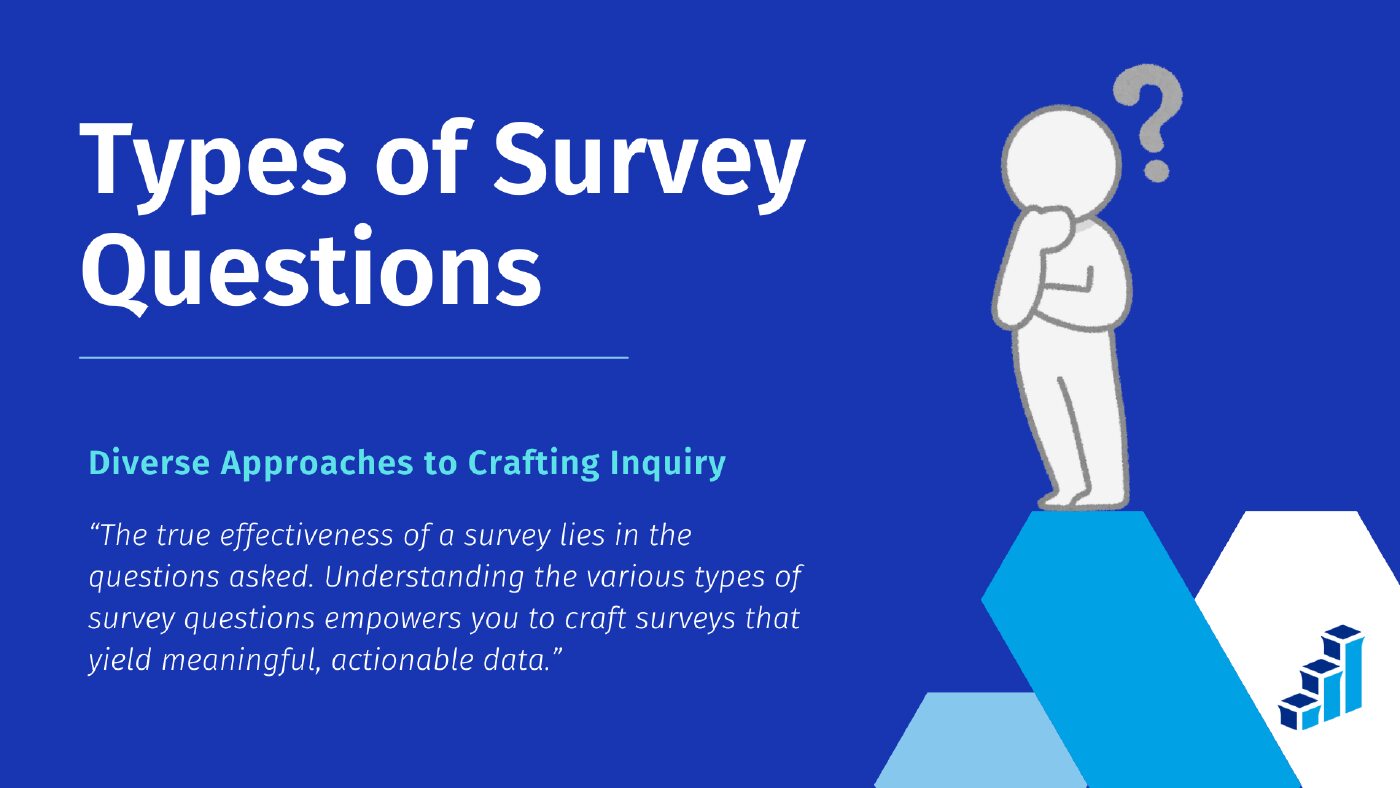
9 Types of Survey Questions for Effective Market Research
The quality of your survey questions plays a pivotal role in market research, distinguishing between merely gathering surface-level information and uncovering actionable insights that can drive your business forward.
Crafting the right questions is an art that requires a deep understanding of your objectives and the nuances of question design.
This guide explores 9 essential types of survey questions, detailing how to create surveys that serve a unique purpose in the quest for meaningful data.
9 Essential Types of Survey Questions Every Researcher Should Know
1. Open-Ended Questions
These questions encourage respondents to provide detailed answers in their own words, offering rich, qualitative insights. They’re invaluable for exploring new topics or gathering nuanced feedback on products or services.
2. Closed-Ended Questions
With predefined answers for respondents to choose from, these questions facilitate straightforward analysis and comparisons. They are ideal for quantifying preferences or behaviors.
3. Rating Scale Questions
Respondents are asked to rate a statement or item on a numeric scale, such as 1 to 5 or 1 to 10. This format is useful for measuring the intensity of feelings or perceptions toward a subject.
4. Likert Scale Questions
A special type of rating scale, Likert questions measure attitudes or opinions with options ranging from strong agreement to strong disagreement. They’re excellent for assessing customer satisfaction or employee engagement.\
5. Multiple Choice Questions
These allow respondents to select one or more options from a list of answers, making them versatile for various research needs. They can simplify complex questions into manageable choices.
6. Dichotomous Questions
Characterized by simple “Yes” or “No” answers, dichotomous questions are great for filtering responses, segmenting respondents, or gathering straightforward data.
7. Nominal Questions
These questions classify responses into categories without implying any order or ranking among them, such as types of industries or methods of transportation used.
8. Demographic Questions
Gathering background information about respondents, such as age, gender, income, education, etc., these questions help in segmenting data and tailoring analyses to specific groups.
9. Matrix Table Questions
Respondents evaluate multiple items using the same set of measurement scales, efficient for comparing products, services, or behaviors across several dimensions.
Tips on When to Use Each Type of Survey Questions
Surveys are a versatile and powerful tool in the field of research, acting as a bridge to uncover valuable insights and data across a wide range of subjects. Serving as a cornerstone in both exploratory and quantifiable research methodologies, surveys can be designed to meet the specific needs of any study.
Understanding what type of research is a survey helps in strategically choosing the right questions to achieve your objectives, whether you’re exploring new ideas or measuring specific variables. Below is a guide for selecting the optimal types of survey questions for your research needs:
- Open-Ended Questions: Best survey questions for exploratory research or when seeking in-depth feedback, these questions allow respondents to express their thoughts freely, providing rich qualitative data.
- Closed-Ended Questions: Ideal for quantifiable research objectives or when you need easily comparable data, these questions limit responses to predefined options, facilitating straightforward analysis.
- Rating and Likert Scale Questions: Useful for gauging degrees of opinion on specific statements or topics, these questions help in measuring intensity of feelings or perceptions.
- Multiple Choice and Dichotomous Questions: Great for surveys targeting a broad audience where simplicity and speed of completion are key, these questions offer a balance between ease of use and informative value.
- Nominal Questions: Best utilized when you need to categorize responses without implying any hierarchy, allowing for the effective segmentation of data.
- Demographic Questions: Crucial for segmenting your data and understanding the characteristics of your respondent groups, these questions collect basic information such as age, gender, education level, and more.
- Matrix Table Questions: Effective for assessing multiple variables in a compact format, these questions save time and space in your survey, making it easier for respondents to provide comprehensive feedback.
Best Practices for Crafting Survey Questions

- Clarity is Key: Ensure questions are straightforward and free from jargon.
- Avoid Bias: Phrase questions neutrally to avoid influencing responses.
- Ensure Relevance: Each question should serve a clear purpose in meeting your research objectives.
- Keep It Engaging: Varied question types can maintain interest and encourage completion.
Conclusion
Selecting the appropriate types of survey questions is pivotal for achieving your research objectives. By leveraging a mix of these question types and adhering to best practices in survey design, you can uncover deep insights and make informed decisions that drive your business forward. Whether it’s understanding customer preferences, gauging product feedback, or segmenting your market, the right questions are your gateway to valuable data.
